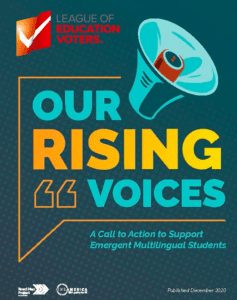By Lizzeth Mancilla
Engagement and Policy Intern
 In collaboration with the Road Map Project, League of Education Voters partner OneAmerica has published a new report, Our Rising Voices: A Call to Action to Support Emergent Multilingual Students. In this webinar, Nimco Bulale, Education Program Manager from OneAmerica, shared takeaways from the report and answered questions from the audience.
In collaboration with the Road Map Project, League of Education Voters partner OneAmerica has published a new report, Our Rising Voices: A Call to Action to Support Emergent Multilingual Students. In this webinar, Nimco Bulale, Education Program Manager from OneAmerica, shared takeaways from the report and answered questions from the audience.
Emergent multilingual students are those who are developing skills in their native language(s), while also learning and engaging in school work in English. Nimco started off her presentation on this report by sharing a powerful anecdote on the importance of supporting these students. “‘Our Rising Voices,’ includes data, research, and stories that showcase the inadequacies of our current education system in supporting immigrant families, especially black and brown emergent multilingual students,” Nimco said.
“We must lead with antiracism and create an education system that works for students and families who have been too long marginalized and denied educational justice. Supporting all students requires we first support those who the system was never designed to support,” she added.
The report covered Southeast Seattle, including Federal Way, Tukwila, Renton, Auburn, etc. They found that 42% of students are emergent multilingual and 89% of these students are students of color, highlighting one reason why transforming racist policies and practices in education is critical for supporting them. The report also found that COVID-19 has become a burden on many families with rising unemployment, economic insecurity, separation of community, inadequate access to online learning, etc.
The English Language Learners (ELL) Work Group consists of educators, community leaders, and other student advocates who “[push] for systems-level change to create a more equitable educational experience.” The top 5 priorities they advocate for are:
(1) Positive identity and primary language development
(2) Diversifying the teacher workforce
(3) Postsecondary success
(4) Data
(5) Community engagement
The ELL Work Group was able to share their recommendations based on the report with educators, school administrators, advocates, and youth councils in small group meetings over the course of two months. These recommendations include changes and support that can be made by policy makers, superintendents, school board directors, advocates, and through programs & practices.
Given how many students are emergent multilingual, supporting them with antiracist strategies is vital to create an inclusive and more equitable learning environment. Schools can help build a culture that values multilingualism by providing dual language classrooms, language programs, and setting policies and practices in place.
“Students are stuck because the system is stuck. The challenges our students face are intersectional and systemic, and not about their own abilities. Being an emergent multilingual is not an obstacle to student success. In fact, being multilingual is a powerful asset,” Nimco said.
Watch the recording of Our Rising Voices: Supporting Emerging Multilingual Students
Love what we do? Support our work
Want to find out the latest in education news in Washington? Subscribe to our newsletter
Want to learn more about League of Education Voters? Find out here